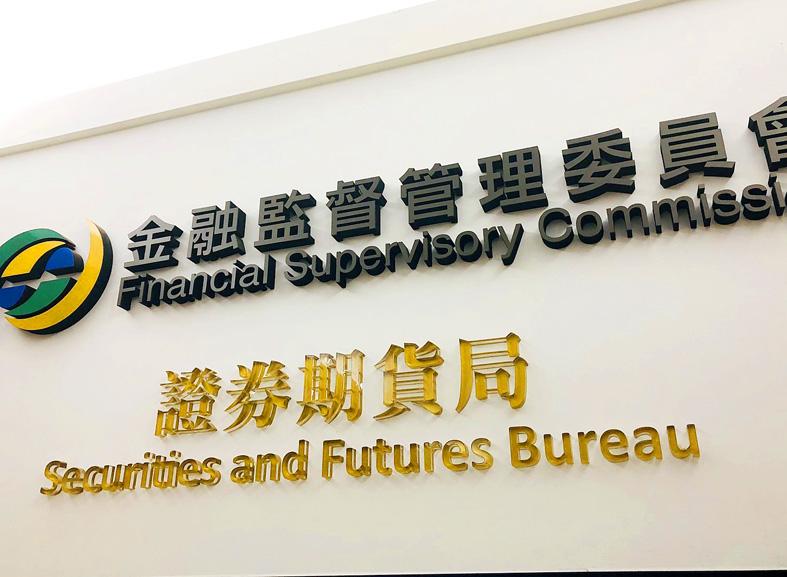Tightened rules on removing executives at publicly traded companies are to come into effect next month, barring board directors from proposing such dismissals through extraordinary motions, the Financial Supervisory Commission said yesterday.
Companies contravening the new rules are to face fines from NT$240,000 to NT$4.8 million (US$8,019 to US$160,385), the commission said, adding that the removal of chairpersons under illegal circumstances would not be recognized by the Minister of Economic Affairs (MOEA).
Currently, board directors can make notification of such motions seven days before a board meeting.

Photo: Kelson Wang, Taipei Times
As removing or electing a company’s head has significant effects, such a motion should not arrive without enough time to be discussed by board members, the Securities and Futures Bureau told an online news conference.
The tightened rules also apply to extraordinary board meetings, and the commission is to have the authority to specify under what conditions board directors can convene such meetings, the bureau said.
“Several companies suggested clearer conditions for holding extraordinary board meetings, as current regulations only apply to meetings in the case of emergency,” bureau Chief Secretary Kao Ching-ping (高晶萍) said.
However, defining what scenarios can be viewed as emergencies is complicated, Kao added.
The commission is planning to provide sample scenarios to companies as references, such as an emergency situation arriving when shareholders fail to elect a new head at an annual general meeting, she said.
In November last year, Solar Applied Materials Technology Corp (光洋科) reshuffled management, with Ma Chien-yung (馬堅勇) being removed as chairman by activist directors through an extraordinary motion.
The removal was dismissed by the MOEA in December, saying the case was not an emergency.

CHIP WAR: Tariffs on Taiwanese chips would prompt companies to move their factories, but not necessarily to the US, unleashing a ‘global cross-sector tariff war’ US President Donald Trump would “shoot himself in the foot” if he follows through on his recent pledge to impose higher tariffs on Taiwanese and other foreign semiconductors entering the US, analysts said. Trump’s plans to raise tariffs on chips manufactured in Taiwan to as high as 100 percent would backfire, macroeconomist Henry Wu (吳嘉隆) said. He would “shoot himself in the foot,” Wu said on Saturday, as such economic measures would lead Taiwanese chip suppliers to pass on additional costs to their US clients and consumers, and ultimately cause another wave of inflation. Trump has claimed that Taiwan took up to

A start-up in Mexico is trying to help get a handle on one coastal city’s plastic waste problem by converting it into gasoline, diesel and other fuels. With less than 10 percent of the world’s plastics being recycled, Petgas’ idea is that rather than letting discarded plastic become waste, it can become productive again as fuel. Petgas developed a machine in the port city of Boca del Rio that uses pyrolysis, a thermodynamic process that heats plastics in the absence of oxygen, breaking it down to produce gasoline, diesel, kerosene, paraffin and coke. Petgas chief technology officer Carlos Parraguirre Diaz said that in

SUPPORT: The government said it would help firms deal with supply disruptions, after Trump signed orders imposing tariffs of 25 percent on imports from Canada and Mexico The government pledged to help companies with operations in Mexico, such as iPhone assembler Hon Hai Precision Industry Co (鴻海精密), also known as Foxconn Technology Group (富士康科技集團), shift production lines and investment if needed to deal with higher US tariffs. The Ministry of Economic Affairs yesterday announced measures to help local firms cope with the US tariff increases on Canada, Mexico, China and other potential areas. The ministry said that it would establish an investment and trade service center in the US to help Taiwanese firms assess the investment environment in different US states, plan supply chain relocation strategies and

Japan intends to closely monitor the impact on its currency of US President Donald Trump’s new tariffs and is worried about the international fallout from the trade imposts, Japanese Minister of Finance Katsunobu Kato said. “We need to carefully see how the exchange rate and other factors will be affected and what form US monetary policy will take in the future,” Kato said yesterday in an interview with Fuji Television. Japan is very concerned about how the tariffs might impact the global economy, he added. Kato spoke as nations and firms brace for potential repercussions after Trump unleashed the first salvo of